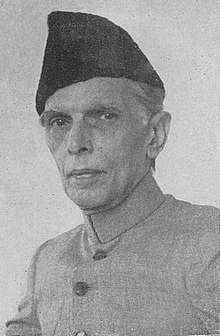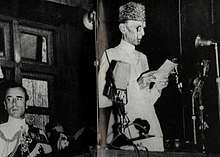Muhammad Ali Jinnah (Urdu, Sindhi:محمد على جناح) (December 25, 1876 – September 11, 1948) was a Muslim politician in the Indian subcontinent and leader of the All India Muslim League who founded Pakistan and served as its first Governor-General. He is officially known in Pakistan as Quaid-e-Azam (Urdu: قائد اعظم — "Great Leader") and Baba-e-Qaum ("Father of the Nation"). His birth and death anniversaries are Holidays in Pakistan.
Quotes
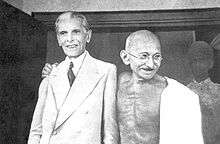
Our object should be peace within, and peace without.

I do not know what the ultimate shape of this constitution is going to be, but I am sure that it will be of a democratic type, embodying the essential principle of Islam.
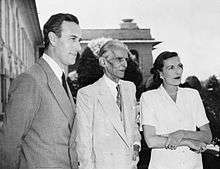
We want to live peacefully and maintain cordial friendly relations with our immediate neighbours and with the world at large.
The Story of Pakistan, its struggle and its achievement, is the very story of great human ideals, struggling to survive in the face of great odds and difficulties.
- I will have nothing to do with this pseudo-religious approach to politics. I part company with the Congress and Gandhi. I do not believe in working up mob hysteria. Politics is a gentleman's game.
- Speaking to journalist Durga Das in London (December 1920) as quoted in Jinnah, Pakistan and Islamic Identity : The Search for Saladin (1997) by Akbar S. Ahmed, p. 67
- Religion should not be allowed to come into Politics….Religion is merely a matter between man and God.
- Address to the Central Legislative Assembly (7 February 1935) [specific citation needed]
- Think a hundred times before you take any decision, but once a decision is taken, stand by it as one man.
- Address to the League Lucknow session in 1937, following elections held under the Government of India Act, as quoted in Mohammad Ali Jinnah, Founder of Pakistan (1976) by Ziauddin Ahmad Suleri, p. 1
- When we say 'This flag (Muslim League's flag) is the flag of Islam' they think we are introducing religion into politics - a fact of which we are proud. Islam gives us a complete code. It is not only religion but it contains laws, philosophy and politics. In fact, it contains everything that matters to a man from morning to night. When we talk of Islam we take it as all embracing word. We do not mean any ill. The foundation of our Islamic code is that we stand for liberty, equality and fraternity.
- Address to the Gaya Muslim League Conference (January 1938) [specific citation needed]
- It is extremely difficult to appreciate why our Hindu friends fail to understand the real nature of Islam and Hinduism. They are not religions in the strict sense of the word, but are, in fact, different and distinct social orders, and it is a dream that the Hindus and Muslims can ever evolve a common nationality, and this misconception of one Indian nation has troubles and will lead India to destruction if we fail to revise our notions in time. The Hindus and Muslims belong to two different religious philosophies, social customs, litterateurs. They neither intermarry nor interdine together and, indeed, they belong to two different civilizations which are based mainly on conflicting ideas and conceptions. Their aspect on life and of life are different. It is quite clear that Hindus and Mussalmans (Muslims) derive their inspiration from different sources of history. They have different epics, different heroes, and different episodes. Very often the hero of one is a foe of the other and, likewise, their victories and defeats overlap. To yoke together two such nations under a single state, one as a numerical minority and the other as a majority, must lead to growing discontent and final destruction of any fabric that may be so built for the government of such a state.
- Presidential Address to All India Muslim League's Session (22 March 1940) [specific citation needed]
- I have always maintained that no nation can ever be worthy of its existence that cannot take its women along with the men. No struggle can ever succeed without women participating side by side with men. There are two powers in the world; one is the sword and the other is the pen. There is a great competition and rivalry between the two. There is a third power stronger than both, that of the women.
- Speech at Islamia College for women (25 March 1940) [specific citation needed]
- The prosperity and advancement of a nation depend upon its intelligentsia, and Muslim India is looking forward to her young generation and education classes to give a bold lead for our guidance and a brilliant record of historical achievements and traditions.
- Speech (24 December 1940), published in Some Recent Speeches and Writings of Mr. Jinnah (1947), Vol. 1
- Islam lays great emphasis on the social side of things. Every day, the rich and the poor, the great and the small living in a locality are brought five times in a day in the mosque in the terms of perfect equality of mankind and thereby the foundation of a healthy social relationship is laid and established through prayer. At the end of Ramazan comes the new moon, the crescent as a signal for a mass gathering on the ‘Id day again in perfect equality of mankind which effects the entire Muslim world.
- Message on the occasion of Eid-ul-Fitr (October 1941) [specific citation needed]
- You have performed wonders in the past. You are still capable of repeating the history. You are not lacking in the great qualities and virtues in comparison with the other nations. Only you have to be fully conscious of that fact and to act with courage, faith and unity.
- Message on Pakistan Day, issued from Delhi (23 March 1943) [specific citation needed]
- No nation can rise to the height of glory unless your women are side by side with you. We are victims of evil customs. It is a crime against humanity that our women are shut up within the four walls of the houses as prisoners. There is no sanction anywhere for the deplorable condition in which our women have to live.
- Speech at a meeting of the Muslim University Union, Aligarh (10 March 1944)[specific citation needed]
- Pakistan not only means freedom and independence but Muslims ideology which has to be preserved which has come to us a precious gift and treasure and which we hope, others will share with us.
- Address to Frontier Muslim Students Federation (18 June 1945) [specific citation needed]
- The Quran is the general code for the Muslims, a religious, social, civil, commercial, military, judicial, criminal and penal code. It regulates every thing, from the ceremonies of religion to those of daily life, from the salvation of the soul to the health of the body, from the rights of all to those of each individual from morality to crime; from punishment here to that in the life to come, and our Holy Prophet Mohammad (Peace by upon Him) has enjoined on us that every Musalman should posses a copy of the Quran and be his own priest. Therefore, Islam is not merely confined to the spiritual tenets and doctrines or ritual and ceremonies. It is a complete code regulating the whole Muslim society, every department of life, collective and individual.
- Eid-ul-Fitar message (September 1945) [specific citation needed]
- You are free to go to your temples, you are free to go to your mosques or to any other place of worship in this State of Pakistan. You may belong to any religion or caste or creed. That has nothing to do with the business of the State.
- Presidential address to the first Constituent Assembly of Pakistan, Karachi (11 August 1947)
- Our object should be peace within, and peace without. We want to live peacefully and maintain cordial friendly relations with our immediate neighbours and with the world at large.
- Address in Lahore (15 August 1947)[specific citation needed]
- We should have a State in which we could live and breathe as free men and which we could develop according to our own lights and culture and where principles of Islamic social justice could find free play.
- Address to Civil, Naval, Military and Air Force Officers of Pakistan Government, Karachi (11 October 1947)[specific citation needed]
- My message to you all is of hope, courage and confidence. Let us mobilize all our resources in a systematic and organized way and tackle the grave issues that confront us with grim determination and discipline worthy of a great nation.
- Eid-ul-Azha Message to the Nation (24 October 1947)[specific citation needed]
- That freedom can never be attained by a nation without suffering and sacrifice has been amply borne out by the recent tragic happenings in this subcontinent. We are in the midst of unparalleled difficulties and untold sufferings; we have been through dark days of apprehension and anguish; but I can say with confidence that with courage and self-reliance and by the Grace of God we shall emerge triumphant.
- Speech at a rally at the University Stadium, Lahore (30 October 1947) [specific citation needed]
- There is no power on earth that can undo Pakistan.
- Speech at a rally at the University Stadium, Lahore (30 October 1947) [specific citation needed]
- The weak and the defenceless, in this imperfect world, invite aggression from others. The best way in which we can serve the cause of peace is by removing the temptation from the path of those who think that we are weak and, therefore, they can bully or attack us. That temptation can only be removed if we make ourselves so strong that nobody dares entertain any aggressive designs against us.
- Address at the time of launching ceremony of PNS 'Dilawar' on (23 January 1948)
- I cannot understand the logic of those who have been deliberately and mischievously propagating that the Constitution of Pakistan will not be based on Islamic Sharia. Islamic principles today are as much applicable to life as they were 1300 years ago.
- Address to Karachi Bar Association (25 January 1948) [specific citation needed]
- As you may be aware, the Government has been making genuine efforts to allay the fears and the suspicions of the minorities and if their (Hindu minority's) exodus from Sindh still continues, it is Not because they are not wanted here, but because they are more prone to listen to people across the border who are interested in pulling them out. I am sorry for those misguided people for nothing but disillusionment awaits them in their 'PROMISED LAND'.
- Reply to an address of the Welcome Note presented by the Parsi Community of Sindh, Karachi (3 February 1948) [specific citation needed]
- Let me make it very clear to you, it is no doubt that the state language of Pakistan is going to be Urdu and no other language. Anyone who tries to mislead you is really the enemy of Pakistan. Without state language, no nation can remain tied up solidly together and function. Look at the history of every government judgement substitute language. Therefore, so far as the State language is concerned, Pakistan's state language shall be Urdu.
- Address to a huge public rally in w:Dhaka, w:East Bengal (then the eastern wing of the w:Dominion of Pakistan and now the independent state of w:Bangladesh) (21 March 1948)
- The constitution of Pakistan has yet to be framed by the Pakistan Constituent Assembly. I do not know what the ultimate shape of this constitution is going to be, but I am sure that it will be of a democratic type, embodying the essential principle of Islam. Today, they are as applicable in actual life as they were 1,300 years ago. Islam and its idealism have taught us democracy. It has taught equality of man, justice and fairplay to everybody. We are the inheritors of these glorious traditions and are fully alive to our responsibilities and obligations as framers of the future constitution of Pakistan. In any case Pakistan is not going to be a theocratic State to be ruled by priests with a divine mission. We have many non-Muslims — Hindus, Christians, and Parsis — but they are all Pakistanis. They will enjoy the same rights and privileges as any other citizens and will play their rightful part in the affairs of Pakistan.
- I have one underlying principle in mind: the principle of Muslim democracy. It is my belief that our salvation lies in following the golden rules of conduct set for us by our great lawgiver, the Prophet of Islam.
- Address to Darbar in Sibi, Balochistan (14 February 1948), as quoted in "World: South Asia Screening the life of Jinnah" in BBC News (13 September 1998)
- The great majority of us are Muslims. We follow the teachings of the Prophet Mohammed (may peace be upon him). We are members of the brotherhood of Islam in which all are equal in rights, dignity and self-respect. Consequently, we have a special and a very deep sense of unity. But make no mistake: Pakistan is not a theocracy or anything like it.
- Broadcast to the people of Australia (19 February 1948)[specific citation needed]
- You have to stand guard over the development and maintenance of democracy, social justice and the equality of manhood in your own native soil. With faith, discipline and selfless devotion to duty, there is nothing worthwhile that you cannot achieve.
- Address to the officers and men of the 5th Heavy Ack Ack and 6th Light Ack Ack Regiments in Malir, Karachi (21 February 1948)[specific citation needed]
- The exploits of your leaders in many a historic field of battle; the progress of your Revolution; the rise and career of the great Atatürk, his revitalization of your nation by his great statesmanship, courage and foresight all these stirring events are well-known to the people of Pakistan.
- Reply to the speech made by the first Turkish Ambassador to Pakistan at the time of presenting Credentials to the Quaid-i-Azam (4 March 1948)[specific citation needed]
- The Story of Pakistan, its struggle and its achievement, is the very story of great human ideals, struggling to survive in the face of great odds and difficulties.
- Address to the people in Chittagong (23 March 1948)[specific citation needed]
- Yet this is a truth people so easily seem to forget and begin to prize local, sectional or provincial interests above and regardless of the national interests. It naturally pains me to find the curse of provincialism holding sway over any section of Pakistan. Pakistan must be rid of this evil.
- Reply to the Civic Address presented by the Quetta Municipality (15 June 1948)[specific citation needed]
- We are now all Pakistanis — not Baluchis, Pathans, Sindhis, Bengalis, Punjabis and so on — and as Pakistanis we must feet behave and act, and we should be proud to be known as Pakistanis and nothing else.
- Reply to the Civic Address presented by the Quetta Municipality (15 June 1948)[specific citation needed]
- I shall watch with keenness the work of your Research Organization in evolving banking practices compatible with Islamic ideas of social and economic life. The economic system of the West has created almost insoluble problems for humanity and to many of us it appears that only a miracle can save it from disaster that is not facing the world. It has failed to do justice between man and man and to eradicate friction from the international field. On the contrary, it was largely responsible for the two world wars in the last half century. The Western world, in spite of its advantages, of mechanization and industrial efficiency is today in a worse mess than ever before in history. The adoption of Western economic theory and practice will not help us in achieving our goal of creating a happy and contended people. We must work our destiny in our own way and present to the world an economic system based on true Islamic concept of equality of manhood and social justice. We will thereby be fulfilling our mission as Muslims and giving to humanity the message of peace which alone can save it and secure the welfare, happiness and prosperity of mankind.
- Address on occasion of opening of State bank of Pakistan (1 July 1948) [specific citation needed]
- I have full faith in my people that they will rise to every occasion worthy of our past Islamic history, glory and traditions.
- Message to the Nation on the occasion of the first Anniversary of Pakistan (14 August 1948) [specific citation needed]
- Character, courage, industry and perseverance are the four pillars on which the whole edifice of human life can be built and failure is a word unknown to me.
- As quoted in Mohammad Ali Jinnah : A Political Study (1962) by M. H. Saiyid, p. 9
- I have lived as plain Mr. Jinnah and I hope to die as plain Mr. Jinnah. I am very much averse to any title or honours and I will be more than happy if there was no prefix to my name.
- As quoted in Plain Mr. Jinnah : Selections from Quaid-e-Azam's Correspondence (1976)
- [Any one could have thought that the limit of Muslim demands was reached and that the 1932 settlement was a final settlement. But it appears that even with this the Musalmans are not satisfied. A further list of new demands for safeguarding the Muslim position seems to be ready. In the controversy that went on between Mr. Jinnah and the Congress in the year 1938, Mr. Jinnah was asked to disclose his demands, which he refused to do. But these demands have come to the surface in the correspondence that passed between Pandit Nehru and Mr. Jinnah in the course of the controversy, and they have been tabulated by Pandit Nehru in one of his letters to Mr. Jinnah. His tabulation gives the following items as being matters of disputes and requiring settlement:—] [...]
(3) The share of the Muslims in the state services should be definitely fixed in the constitution by statutory enactment.
(4) Muslim personal law and culture should be guaranteed by statute.
(5) The Congress should take in hand the agitation in connection with the Sahidganj Mosque [a mosque in Lahore that was part of a Sikh-Muslim dispute] and should use its moral pressure to enable the Muslims to gain possession of the Mosque.
(7) Muslims should have freedom to perform cow-slaughter.
(8) Muslim majorities in the Provinces, where such majorities exist at present, must not be affected by any territorial re-distribution or adjustments.
(9) The 'Bande Mataram' song should be given up.
(10) Muslims want Urdu to be the national language of India and they desire to have statutory guarantees that the use of Urdu shall not be curtailed or damaged.
(11) Muslim representation in the local bodies should be governed by the principles underlying the Communal Award, that is, separate electorates and population strength.
(12) The tricolour flag should be changed or alternately the flag of the Muslim League should be given equal importance.
(13) Recognition of the Muslim League as the one authoritative and representative organization of Indian Muslims.- Quoted from B.R. Ambedkar, Pakistan or The Partition of India (1946)
Address to the Constituent Assembly (1947)
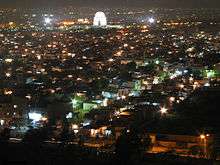
My guiding principle will be justice and complete impartiality, and I am sure that with your support and co-operation, I can look forward to Pakistan becoming one of the greatest nations of the world.
- The Constituent Assembly has got two main functions to perform. The first is the very onerous and responsible task of framing the future constitution of Pakistan and the second of functioning as a full and complete sovereign body as the Federal Legislature of Pakistan.
- This mighty sub-continent with all kinds of inhabitants has been brought under a plan which is titanic, unknown, unparalleled. And what is very important with regards to it is that we have achieved it peacefully and by means of an evolution of the greatest possible character.
- The first and the foremost thing that I would like to emphasize is this — remember that you are now a sovereign legislative body and you have got all the powers. It, therefore, places on you the gravest responsibility as to how you should take your decisions. The first observation that I would like to make is this: You will no doubt agree with me that the first duty of a government is to maintain law and order, so that the life, property and religious beliefs of its subjects are fully protected by the State.
- A division had to take place. On both sides, in Hindustan and Pakistan, there are sections of people who may not agree with it, who may not like it, but in my judgement there was no other solution and I am sure future history will record is verdict in favour of it. And what is more, it will be proved by actual experience as we go on that was the only solution of India's constitutional problem. Any idea of a united India could never have worked and in my judgement it would have led us to terrific disaster. Maybe that view is correct; maybe it is not; that remains to be seen.
- Now, if we want to make this great State of Pakistan happy and prosperous, we should wholly and solely concentrate on the well-being of the people, and especially of the masses and the poor. If you will work in co-operation, forgetting the past, burying the hatchet, you are bound to succeed. If you change your past and work together in a spirit that everyone of you, no matter to what community he belongs, no matter what relations he had with you in the past, no matter what is his colour, caste or creed, is first, second and last a citizen of this State with equal rights, privileges, and obligations, there will be no end to the progress you will make.
I cannot emphasize it too much. We should begin to work in that spirit and in course of time all these angularities of the majority and minority communities, the Hindu community and the Muslim community, because even as regards Muslims you have Pathans, Punjabis, Shias, Sunnis and so on, and among the Hindus you have Brahmins, Vashnavas, Khatris, also Bengalis, Madrasis and so on, will vanish.
- You are free; you are free to go to your temples, you are free to go to your mosques or to any other place or worship in this State of Pakistan. You may belong to any religion or caste or creed — that has nothing to do with the business of the State. As you know, history shows that in England, conditions, some time ago, were much worse than those prevailing in India today. The Roman Catholics and the Protestants persecuted each other. Even now there are some States in existence where there are discriminations made and bars imposed against a particular class. Thank God, we are not starting in those days. We are starting in the days where there is no discrimination, no distinction between one community and another, no discrimination between one caste or creed and another. We are starting with this fundamental principle that we are all citizens and equal citizens of one State.
- In due course of time, Hindus will cease to be Hindus and Muslims will cease to be Muslims, not in a religious sense because that is the personal faith of an individual, but in a political sense as citizens of one state.
- I shall always be guided by the principles of justice and fairplay without any, as is put in the political language, prejudice or ill-will, in other words, partiality or favouritism. My guiding principle will be justice and complete impartiality, and I am sure that with your support and co-operation, I can look forward to Pakistan becoming one of the greatest nations of the world.
Quotes about Jinnah
One of the most extraordinary men in history. ~ Jawaharlal Nehru
- Alphabetized by author
- The words are Jinnah’s; the thought and belief are an inheritance from the Prophet who said thirteen centuries before, “All men are equal in the eyes of God. And your lives and your properties are all sacred: in no case should you attack each other’s life and property. Today I trample under my feet all distinctions of caste, colour and nationality
- The remarks of Hector Bolitho about Jinnah's address to the Constituent Assembly (1947)[citation needed]
- Mr Jinnah, was great as a lawyer, once great as a Congressman, great as a leader of Muslims, great as a world politician and diplomat, and greatest of all as a man of action. By Mr. Jinnah's passing away, the world has lost one of the greatest statesmen and Pakistan its life-giver, philosopher and guide.
- Sarat Chandra Bose, as quoted in My Brother (1987) by Fatima Jinnah, ISBN 969-413-036-0
- Muhammad Ali Jinnah was the greatest benefactor of Hindus in modern times, if he was not a Hindu in disguise.
- Girilal Jain, in The Hindu Phenomenon (1994), p. 56, ISBN 81-86112-32-4
- But there is no doubt that the creation of Pakistan was the triumph of violence—in its naked and most brutal form—and of the leadership of Jinnah. Nobody can be reasonably sure that India would have surely attained Independence...even without Gandhi, but it is extremely doubtful whether there would have been a Pakistan without Jinnah. So, if we are to judge by the result alone, the events of 1946-7 testify to the superiority of violence to non-violence in practical politics, and of Jinnah to the leaders of the Congress.
- R.C. Majumdar. History of the Freedom Movement in India: Preface to Volume 3: R.C. Majumdar, Firma K.L Mukhopadhyay, Calcutta. also quoted in S. Balakrishna, Seventy years of secularism.
- One of the most extraordinary men in history.
- Jawaharlal Nehru, first prime minister of India, as quoted in Men Who Overturned Empires : Fighters, Dreamers, and Schemers (1987) by Hugh Tinker, p. 62
- Gandhi died by the hands of an assassin; Jinnah died by his devotion to Pakistan.
- Lord Pethick-Lawrence, as quoted in My Brother (1987) by Fatima Jinnah
- He would not let himself be deflected nor allow his followers to be deflected by a bewildering multiplicity of religious, cultural, social, economic and other issues. Step by step, slowly and steadily he took his followers forward to their cherished goal. He believed in full and thorough preparation before an action was taken.
- Ziauddin Ahmad Suleri, in Mohammad Ali Jinnah, Founder of Pakistan (1976), p. 1
- Jinnah was the originator of the dream that became Pakistan, architect of the State and father of the world's largest Muslim nation. Mr. Jinnah was the recipient of a devotion and loyalty seldom accorded to any man.
- Harry S. Truman, 33rd president of the United States[1]
- Few individuals significantly alter the course of history. Fewer still modify the map of the world. Hardly anyone can be credited with creating a nation-state. Mohammad Ali Jinnah did all three.
- Stanley Wolpert, in Jinnah of Pakistan (1984), ISBN 0-614-21694-X
- The most important man in Asia.
- Beverley Nichols in Verdict on India
- The old Advocate of Unity, Mr. M.A.Jinnah, … was advanced than his colleagues, and stood head and shoulders above them.
- Nehru from his book Freedom at Midnight
- Honourable Members...I ask you, Members, to stand in your places to pay our tribute of respect to Quaid-e-Azam Mohammed Ali Jinnah, who by his grim determination and stead fast devotion was able to carve out and found Pakistan and whose passing away at this moment is an irreparable loss to all.
- Dr. Rajendra Prasad addressing the Constituent Assembly of India on Thursday, 4 November 1948. Constituent Assembly Debates, Book No. 2, Volume VII: 4 November 1948—8 January 1949: Lok Sabha Secretariat, 1999
References
- ↑ Saeed, Hajra (11 September 2015). The exalted Quaid-e-Azam Muhammad Ali Jinnah. The Nation. Retrieved on 24 September 2019.
External links
This article is issued from
Wikiquote.
The text is licensed under Creative
Commons - Attribution - Sharealike.
Additional terms may apply for the media files.
